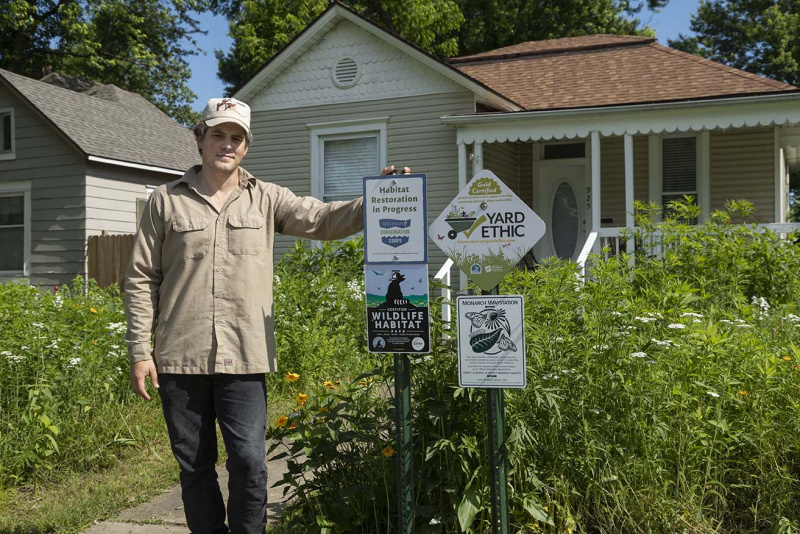When West Central resident Caleb Sanders began growing native plants in his yard, his original intent was to help soak up stormwater. What Sanders didn’t realize was that his landscaping would lead to a stronger connection with his neighborhood.
“The soil in the area retains a lot of water, so I was having issues with moisture in my basement. Native plants help slow down the rain and keep it from filtering down,” explains Sanders, director of the Watershed Conservation Corps for the Watershed Committee of the Ozarks.
He started small in 2017, planting a few “water loving plants” in beds around his house. He noticed an impact in the moisture level after just a few plants. He also noticed he enjoyed spending time outside meeting the variety of people who were out and about in the neighborhood.
“It ended up being such a cool experience, being outside and talking to people. It created a sense of neighborhood for me. Now what inspires me to do it is definitely the community impact. Being outside in your yard, you feel more attached and committed to your neighborhood,” he said.
Following initial success, Sanders then decided to take it another step, installing all native prairie plants throughout his yard and further increasing the time he spends outside on maintenance. He also qualified for gold certification through the City’s Yard Ethic program.
Yard Ethic is a free certification program that encourages and rewards environmentally friendly yard care that can save money, conserve water, reduce stormwater pollution and create habitat. Residents who complete three to five checklist items – testing the soil in their yard, planting native plants, installing a rain barrel and planting a tree – can apply for certification and receive an official Yard Ethic plaque.
“Yard Ethic was really important to help tell the story about what I was doing on the property,” said Sanders. “It gives me an objective source for reasons why this yard works and how it functions in an urban space. It has proven results for my property and surrounding properties.”
When asked the advice he would give to homeowners considering native landscaping, he reemphasizes time commitment and the importance of planning.
“This is not an out for mowing,” he explains. “If you go down the route of native plants, even in a small garden, the amount of weeding and time you will spend will be a considerable commitment. You can’t just throw a bunch of native seeds down and never tend to them again.”
“You also can’t over plan any sized project,” continues Sanders. “Look at species height, species composition and plan around that. Some species are more aesthetic and have longer periods of blooming and some just end up really tall. At this point I’m still refining my plant palette and that’s something I should have done more at the beginning.”
Sanders’ favorite native plants are:




To learn more about yard maintenance resources offered through Yard Ethic and apply for certification, visit YardEthic.com.


